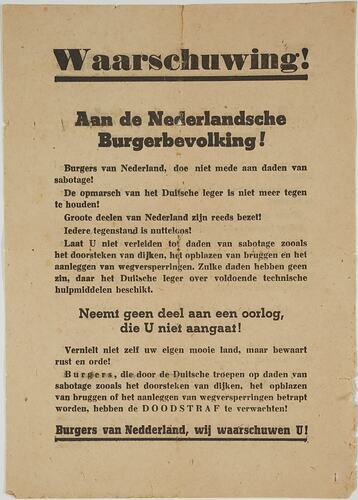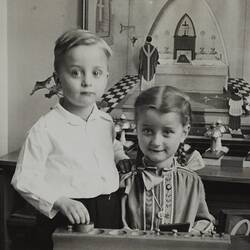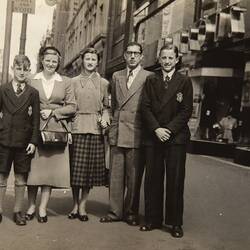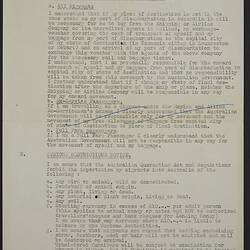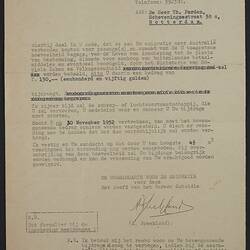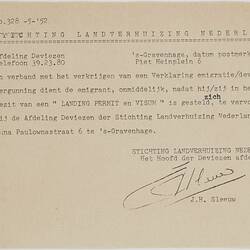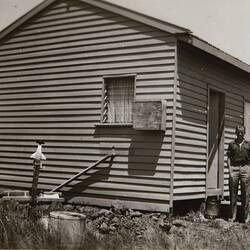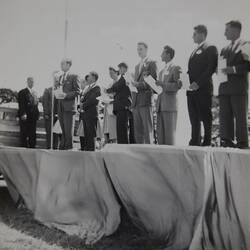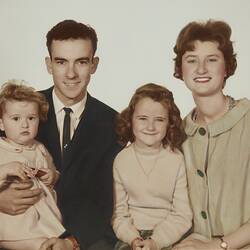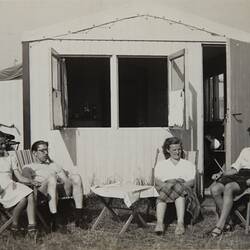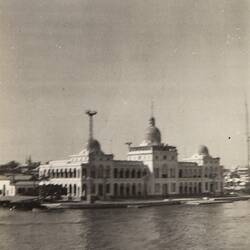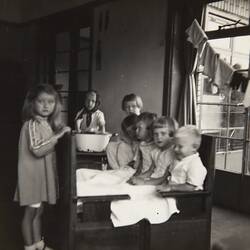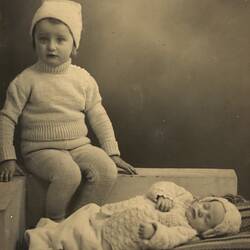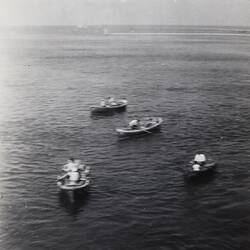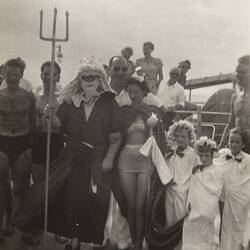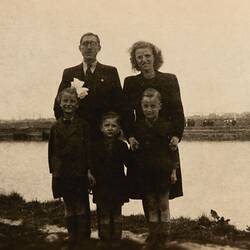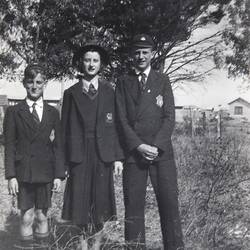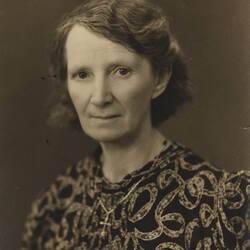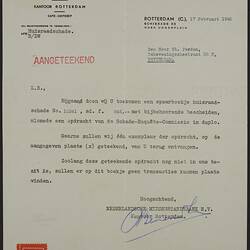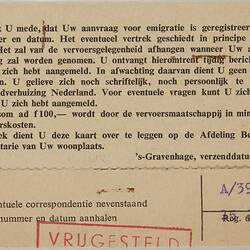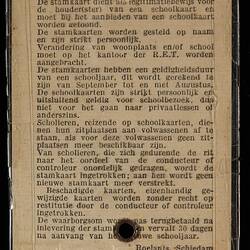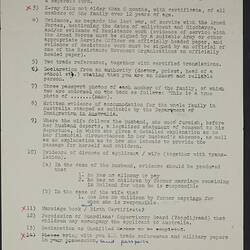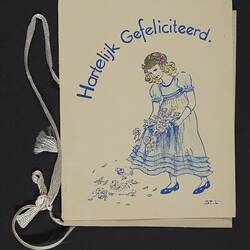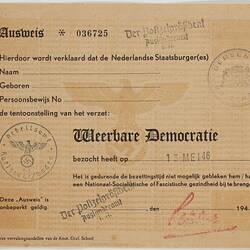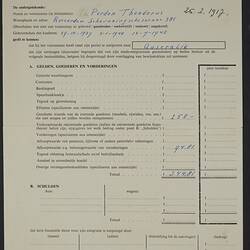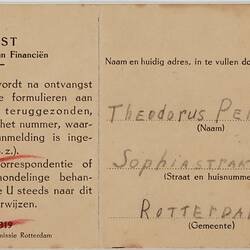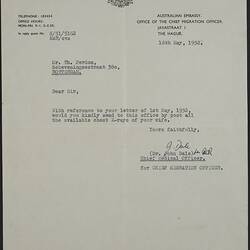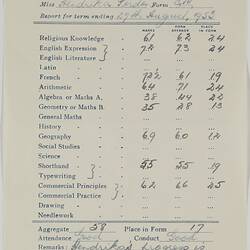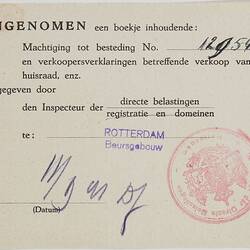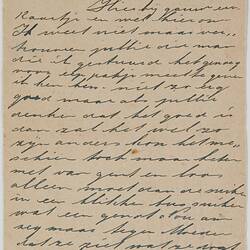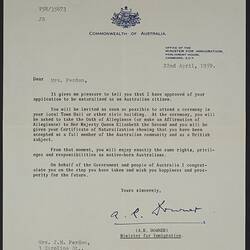Summary
Johanna (Ann) Perdon and her daughter Hendrika (Ricky) Schwab (nee Perdon) survived the dangers and deprivations of Occupied Rotterdam during Worlkd War II.
The following is the story of Johanna (Ann) Perdon and her daughter Hendrika (Ricky) Schwab (nee Perdon) as related by Hendrika's daughters Susan Allen and Chris Cairns and provided to the Museum in 2019.
Importance of Remembering:
'Our grandmother Ann and mother Ricky related to my sister and I the circumstances they lived under and faced as citizens of the Netherlands during the Second World War and the German occupation of their country. They lived in Rotterdam. They wanted us to remember their recollections and experiences as they believed that understanding the horrors and deprivations of war would ensure it wouldn't be repeated. Our grandmother kept documents that she thought would be historically important, our mother placed these in an album describing their meaning.'
Bombing of Rotterdam:
'Ann related how the bombing of Rotterdam affected them directly. At this time she was a young woman with two toddlers and a baby, our mother Ricky was a three year old, our uncle Bill (Wilhelmus) was two and Theo (Theodorus) just a baby. As the bombs rained on the city, she said it was as black as night in the middle of the day. One of the bombs landed in the front of the house they were living in, however it didn't explode on impact.
Ann quickly decided to evacuate the house and seek refuge in the hospital where our grandfather worked as a hospital orderly, fleeing the house with a baby on one hip and the two little ones holding onto her. She had to step over the bomb with her babies and run through the burning streets to the nearby hospital. Our mother Ricky says her first childhood recollection was sitting in the basement of the hospital on the steps, as the ground and building shook while the bombs continued to fall around them. She said she was terrified.'
For a Piece of Bread:
'Ann described the horror of people starving during the war. One particular event that deeply affected her was a young teenager that had been caught stealing some bread. She said the German soldiers made him stand on the corner of a street for three days holding a sign that said 'I am a thief'; he was told they would release him after this. However when the time came to let him go they shot him.'
A Desperate Journey:
'At another time, later in the war, Ann decided to sell clothing she had sewn, in the rural part of Holland, in exchange for food. She rode a bicycle that had no tyres, only metal rims out into the countryside, leaving what little food they did have with neighbours to feed her children. It later transpired the neighbours kept the food for themselves. Our mother Ricky recalls sitting on the front door steps of the house with her brothers waiting for our grandmother to return (Mum showed us that house in 2015 when we visited the Netherlands, we had a photo taken on the steps with her).
It took Ann three days to make the exchange; she was malnourished but rode into the farming areas and managed to exchange the clothing for potatoes and some eggs. The eggs were precious and she hid these in the centre of the potato bag. When she reached the bridge that would take her back into her section of Rotterdam, she was faced with a young German soldier guarding the bridge. It was getting late and close to curfew. Our grandmother explained to us that if you were caught out on the streets after curfew, you could be shot. The young German soldier stated he had been ordered not to let anyone cross that bridge. This meant Ann would need to travel further to reach another bridge to cross the river (a significant undertaking in her state) and would put her well after curfew.
She told the young soldier about her dilemma and her waiting children. She said he was torn but held that she couldn't cross the river there. She asked what would happen if she simply crossed. He said he would have to shoot her. She was exhausted due to her malnourishment and her journey and worried about her three small children waiting for her. So she crossed despite his warnings. She said the entire time she was on the bridge she was waiting for a bullet to strike her in the back. However he let her go.'
A Pilot's Bravery:
'Ann also related examples of bravery. She often told of an event she observed where an allied plane (she thought it was British) had been shot down over them in Rotterdam. She said the plane was going to crash into a row of occupied houses, and that the pilot clearly made a dying effort to pull the plane up and over the houses to bring the plane down in a canal and saving countless lives. She said after the war, the local community placed a plaque in the area acknowledging his actions and bravery.'
Final Reflections:
'The documents our grandmother Ann collected, many of which are now in the Museums Victoria collection, illustrate the occupation of the Netherlands and the family's subsequent immigration to Australia. These documents were well hidden, because if found, she would have been charged with holding and inciting underground propaganda. Our grandmother said that the family had the choice of emigrating to Canada, South Africa and Australia. She told us she reasoned Canada was too cold; she didn't support apartheid, so she chose Australia.
Our grandmother Ann and mother Ricky related many other stories of their lives during this time. These events shaped their lives. They never wasted food; every scrap of leftovers was reimagined into another dish. My sister and I were taught it was a sin to be wasteful, something we have passed on to our families.'
More Information
-
Keywords
-
Authors
-
Article types
